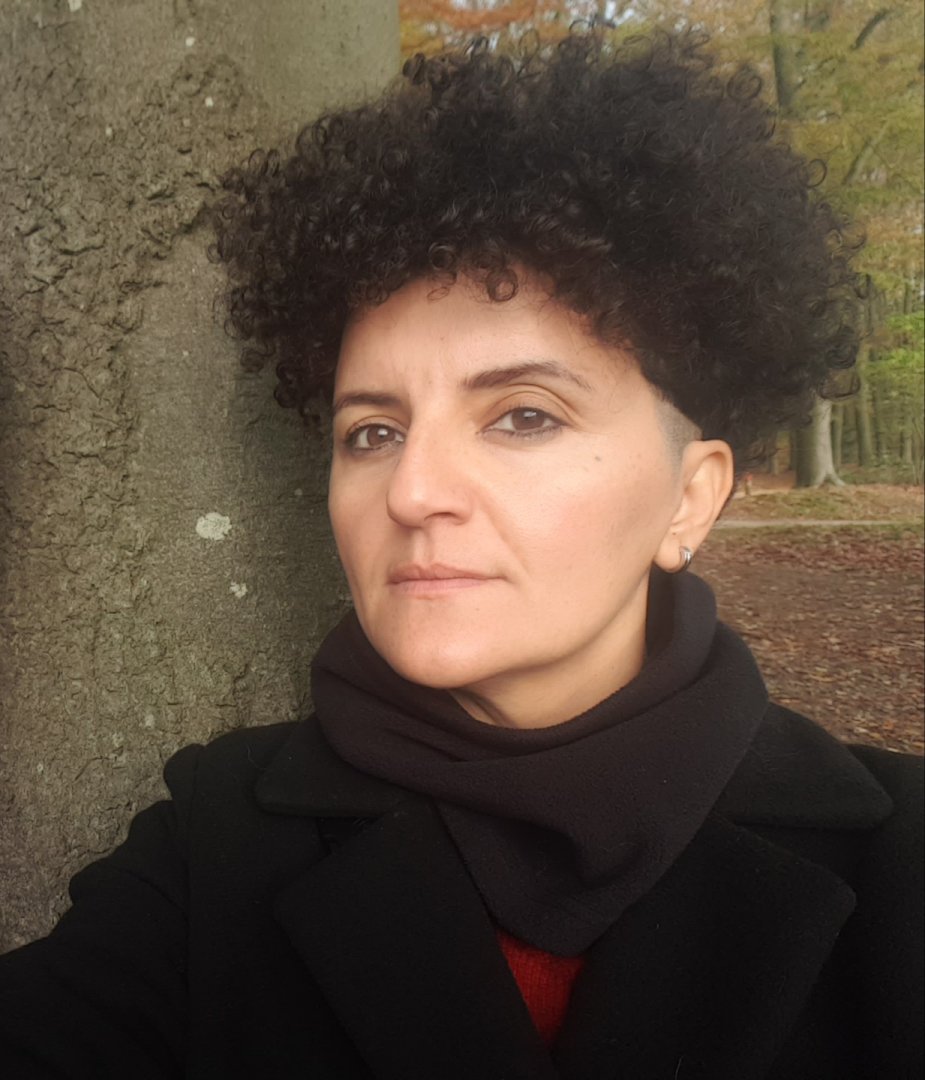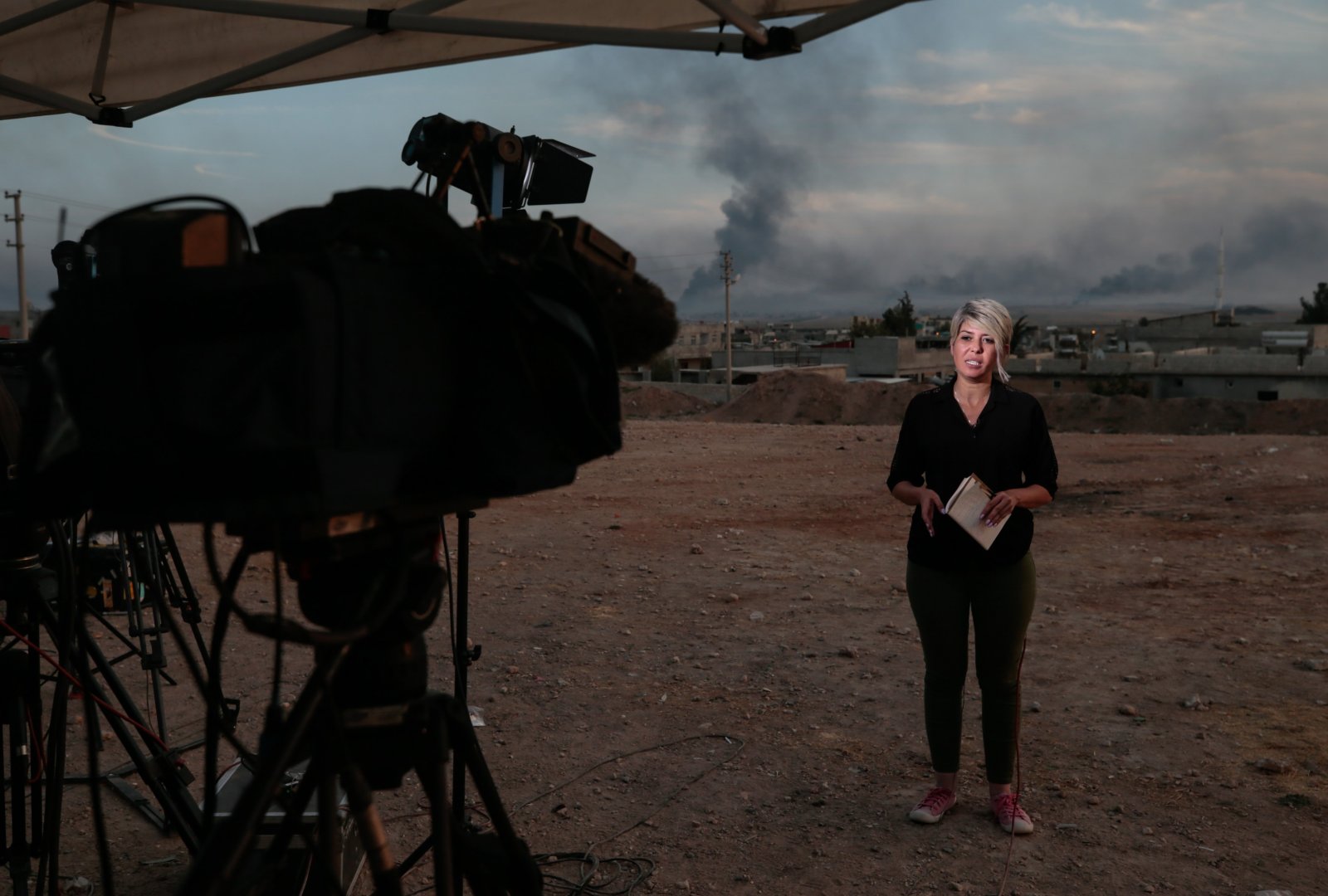
(Photo by Ashraf Amra/Anadolu Agency via Getty Images)
Syrian Female Journalists Network: We need to talk gender equality in media during Covid-19
The consequences of Covid-19 will affect media all over the world, but women journalists are particularly vulnerable. The Syrian Female Journalists Network works to improve the working conditions and safety of women journalists in and through media, and its cause is no less important during a pandemic.
Learn more about Syrian Female Journalists Network and their work in the context of Covid-19 at UNESCO’s World Press Freedom Day Conference 9 Dec, 16.45 CET where eight IMS partners share their main learnings and developments during the pandemic. More information here.
Syrian Female Journalists Network (SFJN) is an organisation that “builds bridges between media and the Syrian women’s movement through capacity building, gender equality and justice”. Since 2012, it has conducted research and provided trainings for journalists and human rights defenders as well as created coalitions to improve the inclusion of women in media. The network was founded in the Netherlands, and as Syrian media consists of many hubs outside the country – particularly in Germany and Turkey – it works with journalists based in Syria and living in exile.
Covid-19 challenges
Since its founding, SFJN’s strategy has revolved around alliances, partnerships and networks. To a small organisation like theirs, Covid-19 presents serious challenges that risk harming long-term developments. On both short-term and long-term scales, the epidemic is putting pressure on valuable relationships.
On the short-term scale, the Executive Director of SFJN Rula Asad worries that she will have to let go of colleagues that she has worked with for years. “If we don’t get the funding we need, we’ll have to make tough decisions on where and how to cut back on our programmes,” she says.
Downscaling and letting people go will be an issue for the organisation itself, but Rula Asad predicts that it will also have significant consequences for the work promoting gender equality in Syrian media in the long run:
“SFJN works on developing an inclusive, gender sensitive media discourse from a feminist perspective. This effort requires a lot of time, energy, human resources, discussions, meetings, following up, developing, going back and forth. If we don’t have qualified staff to keep the connections warm, we’ll lose connections, network and partnerships along the way,” she says.

She continues: “All the work to build coalitions and alliances might disappear, and if we’re not present to insist that this work is important during a crisis like this, priorities and interests will change towards something more immediate.”
Focusing on mental health is essential
Another yet unseen – and still quite overlooked – consequence that Rula Asad fears will have big implications in the future is that journalists and human rights defenders will burn out and simply leave their profession.
“The women we work with report to us that their main challenge during this crisis is extra labour. The pandemic has increased their workload professionally as well as added to the domestic and emotional labour,” she says. On a global basis, research has shown that women were already doing much of the unpaid care work, but that the pandemic has “resulted in a dramatic increase of this burden”.
On top of this, the pandemic exacerbates existing problems for women journalists that make them leave the industry. One major issue is that statistically women journalists in Syrian media are not the ones getting stable contracts, but often work as freelancers and volunteers. With the global economic crisis and a struggling media economy, Covid-19 will only make women’s working conditions even more uncertain and unstable. Another serious issue is the bullying, harassment and lack of safety of women journalists as many don’t consider journalism an acceptable profession for women.
“In many societies, it’s not acceptable to be a woman journalist because you have to be physically and mentally outside your own private circles, exploring the world and expressing your opinion on it. We fear that the pandemic will have negative effects on gender equality overall as well as women’s possibilities to enter and remain within the profession,” says Rula Asad.
Adding these long-existing challenges to the many others that Covid-19 has brought – fear of contracting the virus (especially for those who are based or work with sources based in areas with poor health capacity), restrictions on movement, trouble of accessing information and working overtime – one of the main conclusions of SFJN during the pandemic has been the importance of mental health services:
“Supporting the mental and emotional health of media and human rights organisations staff is a key issue that needs attention today, not down the road when we actually start to see the consequences.”
Internally, that has meant new initiatives at SFJN: “What I’ve learned during Covid-19 is to better support the collective wellbeing. People need it! Now we’re trying to develop ways for everyone to share complaints and frustrations from their personal and professional lives. We’re reducing working hours from time to time and pushing for the team to take days off,” Rula Asad explains.
Focusing on gender equality is crucial during a crisis
Since the outbreak of Covid-19, SFJN has continued their efforts to increase the safety and improve the working conditions of women journalists in Syrian media. One thing that Rula Asad mentions as an important practicality that the network has provided is stable internet services.

“Since the journalists and human rights defenders are not able to travel, they need good internet to work and to participate in our trainings. What we know for certain is that trainings on gender and conflict sensitive content production and safety trainings do not become less important in a crisis – if anything, they only become more important,” she says.
SFJN is one of the few programmes in the region working on women journalists’ safety and including women’s perspective in media. Since 2016, IMS has supported and collaborated with SFJN on these efforts. Last year, a new programme was started to contribute to achieving the goal of UN Resolution 1325: that women and girls are systematically and sustainably integrated into peace and security.
“This programme is an excellent example of why it’s so important to make inclusion and gender equality a priority during a crisis,” says Rula Asad. Peace agreements are more likely to last if women are included, but unfortunately, they have been kept out of peace processes throughout history.
“What we are doing is linking the peace and security efforts to a media context. We have created a circle of knowledge production, content publishing and discussions – and then we do it all over again,” she explains.
SFJN is not a content producing organisation but enters partnerships with Syrian media that include cross-publication trainings on gender and conflict-sensitive journalism and media monitoring.
“Through these collaborations with media, we promote the active roles women play during a crisis, encourage women’s participation in public debate, amplify women’s perspectives and expertise, put focus on gender-specific challenges and encourage a feminist, inclusive approach. That’s important in all societies – also during Covid-19,” Rula Asad says.
Learn more about IMS’ 1325 programme with partners in Syria, Myanmar and Colombia here.




